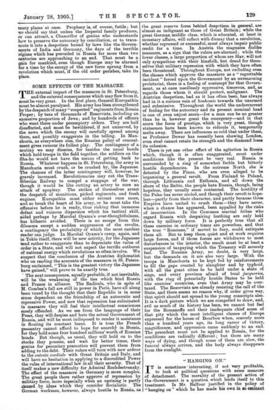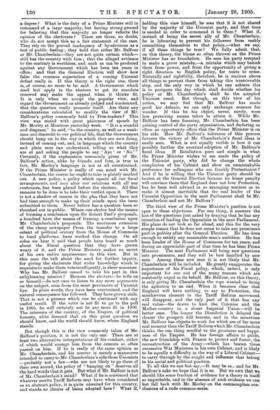I T is sometimes • interesting, if not very profitable, to
look at political questions with some measure of detachment. The morality of the present action of the•Government is a question which lends itself to this treatment. Is Mr. Balfour justified in the policy of " hanging on " which he has made his own in so eminent a degree? What is the duty of a Prime Minister still in command of a large majority, but having strong ground. for believing that this majority no longer reflects the opinion of the electorate P There are those, no doubt, who do not accept this as a fair statement of the case. They rely on the proved inadequacy of by-elections as a test of public feeling ; they hold that either Mr. Balfour or Mr. Chamberlain—they are not quite certain which— still has the country with him ; that the alleged evidence to the contrary is worthless, and such as can be produced against any Government which has been ten years in office; and that the General Election will show how false the common expectation of a coming Unionist defeat really is. If this theory is the right one, there is, of course, no more to be said. A Government which need but apply to the electors to get its mandate renewed may make the appeal when it thinks fit. It is only when we accept the popular view, and regard the Government as already judged and condemned, that the question really presents itself. Are there any considerations calculated to modify the view of Mr. Balfour's policy commonly held by Free-traders ? This view was stated with great plainness of speech by Mr. Morley at Montrose yesterday week. " It is a scandal and disgrace," he said, "to the country, as well as a weak- ness and discredit to our political life, that the Government should hang on in the way in which they are now doing, instead of coming out, and, in language which the country and plain men can understand, telling us what they are at and asking the people to say Aye ' or No." Certainly, if the explanation commonly given of Mr. Balfour's action, alike by friends and foes, is true in fact, Mr. Morley's language is not at all overstrained. If the Prime Minister is really of one mind with Mr. Chamberlain, the course he ought to take is plainly marked out. A new policy, a policy which upsets all our fiscal arrangements, and may alter our relations with all our customers, has been placed before the electors. All that remains to be done is to take their verdict upon it. There is not a shadow of reason in the plea that they have not had time enough to make up their minds upon the issue submitted to them. Never before has a question been so threshed out in public. Where one elector had the means of forming a conclusion upon Sir Robert Peel's proposals, a, hundred have the means of forming a conclusion upon Mr. Chamberlain's proposals. The enormous extension of the cheap newspaper Press, the transfer to a large extent of political oratory from the House of Commons to local platforms, have worked this change. On all sides we hear it said that people have heard so much about the Fiscal question that they have grown weary of it, and the Prime Minister makes no secret of his own entire acquiescence in this view. But in this case the talk about the need for further inquiry, for giving the electorate that wider knowledge which is requisite to make them vote intelligently, is sheer nonsense. Why has Mr. Balfour ceased to take his part in this enlightening mission ? Because the electors—he tells us so himself—do not care to listen to any more arguments on the subject, even from the most persuasive of Unionist lips. In plain words, they have been overtrained, and the natural consequence has followed. They have grown stale. That is not a process which can be continued with any useful result. If the voter is not fit to go to the poll in 1905, he will certainly not be any more fit in 1906. The interests of the country, of the Empire, of political honesty, alike demand that on this great question we should laaow, and the world should know, where England stands.
But though this is the view commonly taken of Mr. Balfour's position, it is not the only one. There are at least two alternative interpretations of his conduct, either of which would exempt him from the censure so often passed on him. If he is really of the same opinion as Mr. Chamberlain, and his reserve is merely a manoeuvre intended to carry to Mr. Chamberlain's side those Unionists —probably not a few—who are not likely to go there of their own accord, the policy of " hanging on " deserves all the hard words that it gets. But what if Mr. Balfour is not of Mr. Chamberlain's mind? What if he is convinced that whatever merits Tariff Reform may have when considered as an abstract policy, it is quite unsuited for this country,• and stands no chance of being adopted here ? What if. holding this view himself, he sees that it is not shared by the majority of the Unionist party, and that time is needed in order to commend it to them ? What if,' instead of being the secret ally of Mr. Chamberlain, he is labouring to prevent his followers from rashly committing themselves to that policy,—what we say, if all these things be true ? We fully admit that, on this theory, the blame so often thrown on the Prime • Minister has no foundation. He sees his party tempted to make a grave mistake,—a mistake which may banish them from power, and from the opportunity of giving a. right direction to English policy, for years to some. Naturally and rightfully, therefore, he is anxious above all things to prevent them from taking this irretrievable step, and the only way in which he can achieve this is to postpone the day which shall decide whether his policy or Mr. Chamberlain's shall be the accepted Unionist • creed. But though, on this view of his action, we may feel that Mr. Balfour has made' good his defence, we can only exchange censure for wonder. If this be his object, never, surely, were less promising means taken to attain it. While Mr. Balfour has been finessing, Mr. Chamberlain has been' gaining control of the party organisation, and declaring as often as opportunity offers that the Prime Minister is on his side. How Mr. Balfour's tolerance of this process favours the victory of Mr. Chamberlain's fiscal ideas is easily seen. What is not equally visible is how it can possibly further the eventual adoption of Mr. Balfour's fiscal ideas. If Retaliation pure and simple is what the Prime Minister wishes to see made the policy of the Unionist party, why did he change the whole complexion of his Cabinet and show an unmistakable preference for colleagues who are frankly Protectionist ? And if he is willing that the Unionist party should be beaten at the General Election because no lesser penalty will convince them that England does not love Protection, has he been. well advised in so managing matters as to make it almost inevitable that the real leader of the Unionist Opposition in the next Parliament shall be Mr. Chamberlain and not Mr. Balfour ?
The third view of the Prime Minister's position is not open to these objections. For one thing, it answers the last of the questions just asked by denying that he has any intention of leading the Opposition in the next Parliament. His plans do not look so far ahead, and this for the very simple reason that he does not mean to take any prominent part in politics after the General Election. He has done. enough to satisfy any reasonable man's ambition. He has been Leader of the House of Commons for ten years, and during an appreciable part of that time he has been Prime Minister. The next Parliament will bring new questions into prominence, and they will be best handled by new men. Among these new men it is not likely that Mr. Chamberlain will be included. He greatly exaggerates the importance of his Fiscal policy, which, indeed, is only important for one out of the many reasons which are constantly urged in its behalf. Mr. Balfour, on this theory, is only giving Mr. Chamberlain the rope wanted to bring the agitation to an end When it becomes clear that' England will have nothing to say to Protection, the mischievous element in the Tariff Reform movement will disappear, and the only part of it that has any real value—the desire to knit the Colonies and the Mother-country in a closer Imperial Union—will be better seen. The longer the Dissolution is delayed the clearer the prospect will become, and in the meantime Mr. Balfour has objects to work for which are of far more real moment than the Tariff Reform which Mr. Chamberlain thinks the one thing needful to the greatness and happi- ness of the Empire. He has foreign affairs to guide, the new friendship with France to protect and foster, the reconstruction of the Army—which has beaten three successive War Ministers in his own Cabinet, and is likely' to be equally a difficulty in the way of a Liberal Cabinet— to carry through by the weight and influence that belong to his social and political position.
To all this we can but say,—It may be so; and for Mr. Balfour's sake we hope that it is so. But we own that we should. like some fraction of evidence for a thedry ih itself, so improbable, and in the absence of such evidence we can but fall back with Mr. Morley on .the commonplace con: elusions of a rude common-sense.























































 Previous page
Previous page